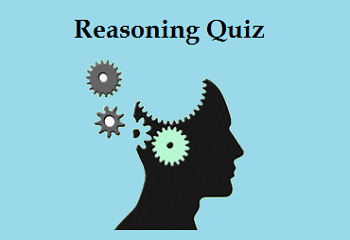Hello Aspirants. Welcome to Online Reasoning Section in AffairsCloud.com. Here we are creating question sample in Inequalities, which is common for all the IBPS,SBI exam and other competitive exams. We have included Some questions that are repeatedly asked in bank exams !!!
- Statements:
P < Q ≤ S = T, R = Q < U, V > U
Conclusions:
I. P > U
II. V > T
1 : if only conclusion I follows.
2 : if only conclusion II follows.
3 : if either conclusion I or conclusion II follows.
4 : if neither conclusion I nor conclusion II follows.
5 : if both conclusions I and II follow.4 : if neither conclusion I nor conclusion II follows.
- Statements :
U ≥ X = Y, Y ≤ Z ≤ S, T = W > Z
Conclusions:
I. T ≤ U
II. S > U
1 : if only conclusion I follows.
2 : if only conclusion II follows.
3 : if either conclusion I or conclusion II follows.
4 : if neither conclusion I nor conclusion II follows.
5 : if both conclusions I and II follow.4 : if neither conclusion I nor conclusion II follows. - Statements :
A ≥ P = S > T, V < B = T ≥ X
Conclusions:
I. A > X
II. P < B
1 : if only conclusion I follows.
2 : if only conclusion II follows.
3 : if either conclusion I or conclusion II follows.
4 : if neither conclusion I nor conclusion II follows.
5 : if both conclusions I and II follow.1 : if only conclusion I follows.
- Statements :
S > U > V, Y < U < Z, Z < X > W
Conclusions:
I. S < Z II. X > Y
1 : if only conclusion I follows.
2 : if only conclusion II follows.
3 : if either conclusion I or conclusion II follows.
4 : if neither conclusion I nor conclusion II follows.
5 : if both conclusions I and II follow.2 : if only conclusion II follows.
- Statements :
P < X ≤ Y < Q, S > Y < T, P = V > R
Conclusions:
I. V < S II. T > R
1 : if only conclusion I follows.
2 : if only conclusion II follows.
3 : if either conclusion I or conclusion II follows.
4 : if neither conclusion I nor conclusion II follows.
5 : if both conclusions I and II follow.5 : if both conclusions I and II follow.
- Statements : B ≥ C = D ≥ E ; A ≤ F ≤ P = D
Conclusions :
I. D ≥ A
II. B ≥ F
1 : if only conclusion I follows.
2 : if only conclusion II follows.
3 : if either conclusion I or conclusion II follows.
4 : if neither conclusion I nor conclusion II follows.
5 : if both conclusions I and II follow.5 : if both conclusions I and II follow.
- Statements : P = S < T ≤ U ; Q ≤ U = A ≥ B
Conclusions :
I. Q = B
II. S ≤ A
1 : if only conclusion I follows.
2 : if only conclusion II follows.
3 : if either conclusion I or conclusion II follows.
4 : if neither conclusion I nor conclusion II follows.
5 : if both conclusions I and II follow.4 : if neither conclusion I nor conclusion II follows.
- Statements : A ≥ C > B > D; P < F ≥ C > E
Conclusions :
I. A ≥ E
II. F > D
1 : if only conclusion I follows.
2 : if only conclusion II follows.
3 : if either conclusion I or conclusion II follows.
4 : if neither conclusion I nor conclusion II follows.
5 : if both conclusions I and II follow.2 : if only conclusion II follows.
- Statements : M = N ≤ O ≤ R; P < O ≤ S < T
Conclusions :
I. N = S
II. N < S
1 : if only conclusion I follows.
2 : if only conclusion II follows.
3 : if either conclusion I or conclusion II follows.
4 : if neither conclusion I nor conclusion II follows.
5 : if both conclusions I and II follow.3 : if either conclusion I or conclusion II follows.
- Statements : J ≤ K = M, N ≥ P > K, Q > N = R
Conclusions :
I. R > J
II. Q ≥ M
1 : if only conclusion I follows.
2 : if only conclusion II follows.
3 : if either conclusion I or conclusion II follows.
4 : if neither conclusion I nor conclusion II follows.
5 : if both conclusions I and II follow1 : if only conclusion I follows.
AffairsCloud Recommends Oliveboard Mock Test
AffairsCloud Ebook - Support Us to Grow
Govt Jobs by Category
Bank Jobs Notification



